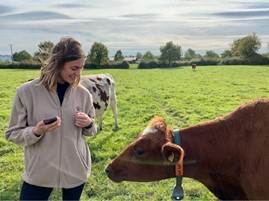With most PhDs spanning 3 to 4 years, it is not a decision to take lightly.
For some students, their passion for research and a specific academic discipline is such that a PhD is an obvious choice as part of their career planning, however, for others it is just one possible option, prompting further questions.
Having an insight into what life is like as a post-graduate researcher is a crucial first step. Without any doubt, you will need to love learning, have a hunger for research, and be a self-starter happy to work for long periods independently. Advice from vitae.ac.uk is to be ‘really clear on your motivations for doing a doctorate, and that it [will be] a positive career step.’
Kayleigh Crouch is a Career Peer Support Adviser with the Careers Service, currently a PGR at the University of Bristol, and has shared her insights on what it’s like to be a doctoral researcher here:

“I completed a BSc (Hons) and MRes in Animal Behaviour and Welfare at Hartpury University (UWE) and quickly realised that I loved research and wanted a career in it.
It was challenging however to know what kind of research, and where this research role might be found.
Also, once I did find an opportunity, I wondered if I would have the skills to conduct PhD level research. As a fresh(ish) master’s graduate, would I be at the right level?
Looking into my options, I found that I was. It’s important to remember that you are not expected to already have all the skills of a finished PhD – otherwise, why would you do one? A PhD is a learning process; so, to reach that level you just have to be motivated and keen to learn!
To find my course, I ran some searches for PhDs on findaphd and jobs.ac.uk and on my university Careers Service website. I found two PhDs that were particularly interesting to me and decided they were the ones I would apply to. Because I was targeting my applications to specific PhDs that interested me, I could spend time and take extra care to meet the requirements in these applications. It felt easier because I was really interested in what I was applying for and was already reading about the topic before I wrote my proposal.
Below are some key bits of advice I have from completing the application writing process.
Quality over quantity
Simple questions answered well are better (and easier to provide) than overly complex or complicated questions. Remember that a PhD is about contributing a new novel piece of work to your field, not reinventing the wheel. Look at other research project rationales/methods/outputs for inspiration here on how much innovation is needed.
Apply for a topic that interests you
It is important during the application process to really consider the kind of PhD you’d like to do and if any funded ones interest you. This is important as it will take at least three years to finish your PhD, and it will be the dominant aspect of your life during that time.
Stop and think about each stage of the application.
It is important to give any application the time and attention it needs to be clear enough to secure funding or an interview. Make sure you tailor your application to the place, the funder, and the institution in which you wish to complete your PhD. Don’t assume funding will be forthcoming just because a university is willing to accept you as a doctoral student – funders have their own criteria! (This is particularly something to be aware of outside of the sciences).
Know what you’re applying for.
Read around the subject. Often the institutions that you’re applying to will have conducted relevant research in this area, and it can be beneficial to know about it. You can then cite it in your proposal and draw upon this knowledge during the discussion and the interview stage. This type of information can usually be found on university websites under personal profiles or research group outputs. This reading exercise will also help to demonstrate your ability to interpret information and communicate it in written and oral formats – two of the most important skills of a researcher.
Interview Tips
Prepare for a PhD interview the same as you would with any kind of job interview by ensuring you are prepared to answer questions related to the characteristics/skills outlined in the PhD advert. This means preparing yourself to speak coherently about examples of times when you have demonstrated skills they are looking for in a candidate, e.g., experience in data analysis, writing reports, and working as part of a team.
Finally, if you are thinking about a PhD then talking to others should be your first step.
For example, you could discuss this with course tutors, or explore this option with a Careers Adviser in one of our 30-minute guidance appointments (that you can arrange via Live Chat) to help you to decide if this is the right path for you.”
If you have made the decision to go ahead and find a programme, start with the links cited by Kayleigh above, and talk to the academic staff involved in postgraduate research within your School and Faculty.
- You can find a wealth of resources on our Further Study webpage
- For any queries regarding funding, you can get started by having a look at our Funding further study guide.
- You can find interview support on our CVs, applications and interviews webpage
- Don’t forget you can talk to us on Live Chat or come and say hello at 5 Tyndall Avenue
